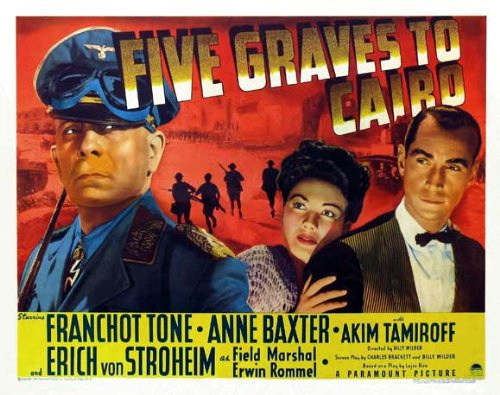Introduction:
“Five Graves to Cairo,” released in 1943, stands as a riveting testament to the art of suspenseful storytelling and gripping wartime drama. Directed by the legendary filmmaker Billy Wilder, this World War II thriller unfolds against the backdrop of the North African campaign, capturing the tension and intrigue of the desert battlefield. In this extensive exploration, we delve into the depths of “Five Graves to Cairo,” dissecting its narrative intricacies, analyzing its thematic richness, and celebrating its enduring legacy in the realm of wartime cinema.
Setting the Stage:
Set during the pivotal stages of World War II, “Five Graves to Cairo” follows the harrowing journey of Corporal John Bramble, a British soldier who narrowly escapes the fall of Tobruk and seeks refuge in a remote desert hotel. There, he assumes the identity of the recently deceased waiter Davos, hoping to gather intelligence on Field Marshal Erwin Rommel’s plans for the Axis forces. As Bramble infiltrates the enemy’s ranks, he uncovers a web of deception, betrayal, and unexpected alliances, culminating in a high-stakes showdown that will determine the fate of the war.
Exploring Character Dynamics:
At the heart of “Five Graves to Cairo” are its richly drawn characters, each grappling with the moral complexities of war and survival. John Bramble, portrayed with steely resolve by Franchot Tone, embodies the courage and determination of the Allied forces as he infiltrates enemy territory at great personal risk. Opposing him is Field Marshal Erwin Rommel, known as the “Desert Fox,” portrayed with commanding presence by Erich von Stroheim. Rommel’s strategic genius and unwavering resolve pose a formidable challenge to Bramble’s mission, setting the stage for a tense and suspenseful confrontation.
Navigating Themes:
Beneath its wartime action and intrigue, “Five Graves to Cairo” grapples with themes of identity, sacrifice, and the human cost of war. As Bramble assumes the guise of the deceased waiter Davos, he confronts the moral ambiguity of his deception and the sacrifices demanded by duty and honor. The film’s exploration of loyalty, betrayal, and redemption resonates with timeless relevance, inviting audiences to ponder the complexities of war and the human capacity for heroism and self-sacrifice.
Celebrating Cinematic Craftsmanship:
Directed by Billy Wilder with characteristic flair and precision, “Five Graves to Cairo” showcases the director’s mastery of suspenseful storytelling and atmospheric filmmaking. From its sweeping desert landscapes to its claustrophobic interiors, every frame of the film is imbued with a sense of urgency and tension. Wilder’s sharp screenplay, co-written with Charles Brackett, crackles with wit and intelligence, while Miklós Rózsa’s haunting score adds to the film’s atmosphere of foreboding and danger. With its taut pacing, memorable performances, and evocative cinematography, “Five Graves to Cairo” stands as a testament to Wilder’s talent and vision as a filmmaker.
Legacy and Influence:
While “Five Graves to Cairo” may not enjoy the same widespread recognition as Wilder’s later masterpieces, its impact on wartime cinema and the director’s own career cannot be overstated. The film’s blend of suspense, intrigue, and wartime drama foreshadows the thematic richness and narrative complexity that would define Wilder’s later works. Despite its modest beginnings, “Five Graves to Cairo” remains a gripping and suspenseful thriller that continues to captivate audiences with its tense atmosphere and compelling characters.
Conclusion:
“Five Graves to Cairo” stands as a riveting testament to the enduring power of wartime cinema to captivate, thrill, and provoke thought. With its gripping narrative, memorable characters, and atmospheric direction, this classic thriller from Billy Wilder continues to enthrall audiences with its timeless appeal. As we revisit the desolate sands of North Africa and witness the harrowing exploits of John Bramble, we are reminded of the enduring legacy of “Five Graves to Cairo” as a cinematic masterpiece that continues to resonate with audiences of all generations. In the pantheon of wartime thrillers, “Five Graves to Cairo” shines as a shining example of the art of suspenseful storytelling and gripping drama.
